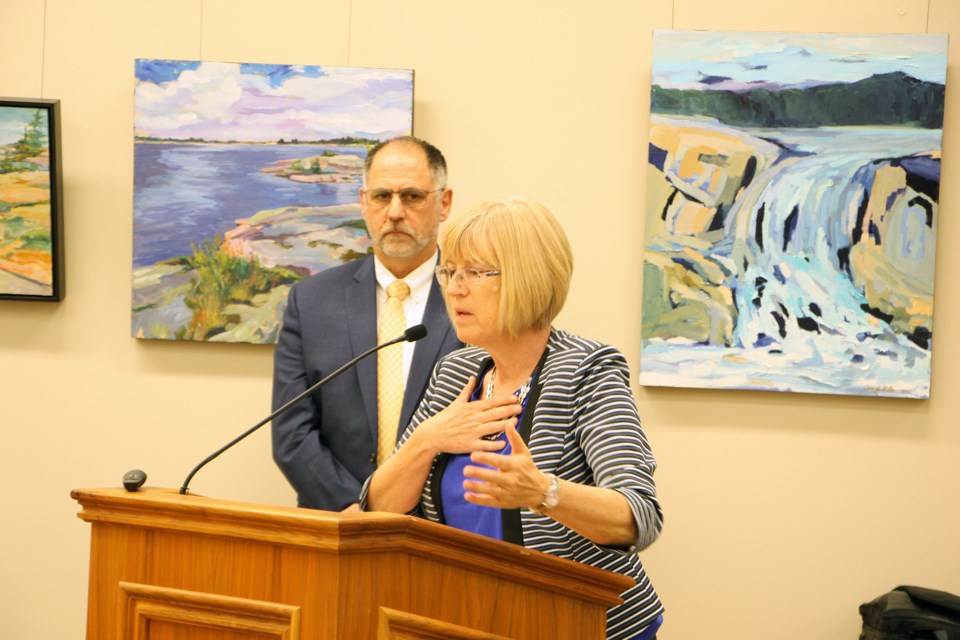When it comes to conflict or bias, how it looks is often just as important as how it is.
That's the message delivered to Collingwood council by its integrity commissioners.
Janice Atwood Petkovski and Jeffrey Abrams, co-principals of Principles Integrity visited council for the May 28 meeting to deliver a report and some training on their roles as integrity commissioner for the town.
Abrams is a former Clerk for the City of Vaughan and Petkovski was the city’s solicitor. The two helped establish a code of conduct and protocol for working with integrity commissioner services while working in Vaughan. They have now started their own firm offering integrity commissioner services to a variety of clients including Simcoe County and Collingwood.
“We live in a time when citizens are skeptical of their elected representatives at all levels,” said Abrams as he read the Principles Integrity mantra. “The perception that a community’s representatives are operating with integrity is the glue which sustains democracy.”
He said the objective in appointing an integrity commissioner is to support and reinforce what he called the “ethical framework.”
“We provide training and confidential advice within that framework, and, if necessary and in the public interest to do so, to investigate complaints,” said Abrams.
Petkovski delivered a report into a complaint against Mayor Sandra Cooper in which Principles Integrity ruled Cooper contravened the municipal code of conduct, but did not recommend any sanctions. The complaint came after Cooper voted against allocating funds to hire a consultant to handle the sale of the Collingwood Regional Airport. The integrity commissioner suggested Cooper should refrain from participating in votes that are in any way related to the airport sale because Cooper’s brother (Paul Bonwick) is a high ranking executive in the Clearview Aviation Business Park, a development company that sells or leases property for aviation-related business at the Collingwood Regional Airport. Click here for the CollingwoodToday story on the integrity commissioner’s findings into the complaint against Cooper.
“The case for determining a code of conduct conflict is an objective test,” said Petkovski. “A councillor has to be mindful of whether a reasonable person would perceive they are making their decision or may be likely influenced in their decision by their personal interest … They have to be mindful of not only actual conflicts but of perceived conflicts.”
The integrity commissioner can investigate complaints based on both the town’s code of conduct and the Municipal Conflict of Interest Act. Due to these two pieces of legislation governing conduct and ethics of municipally elected officials, there are typically two kinds of conflicts.
Petkovski called them disqualifying interests and transparency disclosures.
A disqualifying interest refers to a pecuniary or non-pecuniary interest that prevents the councillor from participating in a matter. In this case, the councillor has an obligation to disclose the information and step away. If a councillor has a pecuniary interest in the matter with a potential financial impact - positive or negative - to themselves or their family members, they should step away from the table and not participate in any step of the decision-making process, according to Petkovski.
A transparency disclosure refers to a possible or perceived bias in the councillor due to their connection to a certain matter before council.
The example Petkovski used is if council was dealing with a vote on a property that abutted onto a councillor’s property.
In cases such as these, where there is perceived bias but not pecuniary interest, a councillor can make a decision on whether they can maintain an open mind in the matter or if they are biased by their connection and cannot make a fair decision.
“An open mind is not a mechanism for overcoming pecuniary interest,” stressed Petkovski. “It is a method for overcoming bias.”
Councillor Kevin Lloyd asked for clarification on the process of investigating complaints, specifically questioning Petkovski and Abrams on a recent email to himself, Coun. Mike Edwards and Mayor Sandra Cooper letting them know there was a complaint but that it was dismissed without a full investigation.
“Why were we not informed?” asked Lloyd. “Is it more open and transparent to let us know when there’s a complaint against us?”
Petkovski and Abrams explained there’s a triage for receiving complaints, which can involve distilling the complaint to get at the conduct issue. Some do not get a full investigation because it is clear the allegations are not a breach of the code of conduct or Municipal Conflict of Interest Act. Abrams suggested it would look chaotic and unorganized for there to be a slew of uninvestigated cases where complaints were dismissed before the investigation stage.
“From our perspective, it’s a timing question,” said Petkovski. “We want to provide transparency, but we don’t want to provide turmoil unnecessarily.”
The email Lloyd was referring to was included in the May 28 council agenda.
“This is to advise that a complaint was filed against the three of you (Cooper, Edwards, Lloyd), alleging that you contravened the code of conduct when you failed to declare a conflict of interest on the matter of the judicial inquiry, given that you were members of council when it decided to sell shares in Collus to Powerstream,” reads the email from Principles Integrity.
The message further states the three members of council did not have a conflict of interest, suggesting this was not a case of improper use of influence as defined in the town’s code of conduct. Additionally, Principles Integrity said the possibility of incurring legal costs personally during a judicial inquiry was remote and speculative and didn’t give rise to a pecuniary interest.
There was no investigation further into the complaint, and the complainant was not identified.
Abrams told council Principles Integrity will return, in most cases, when they are delivering a report about an investigation into a complaint, and suggested council plan an education session soon to learn more about the ethical framework and everyone’s roles and expectations within it.



